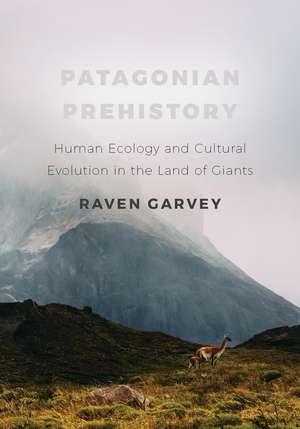Patagonian Prehistory: Human Ecology and Cultural Evolution in the Land of Giants
Autor Raven Garveyen Limba Engleză Hardback – 13 iul 2021
Garvey’s novel hypotheses question common assumptions regarding Patagonia’s suitability for prehistoric hunter-gatherers. She makes four primary arguments: (1) the surprising lack of clothing in parts of prehistoric Patagonia supports a relatively slow initial colonization of the Americas; (2) the sparse record of human habitation during the middle Holocene may be due to prehistoric behavioral changes and archaeological sampling methods rather than population decline; (3) farming never took root in Patagonia because risks associated with farming likely outweighed potential benefits; and, finally, (4) the broad trajectory of cultural change in Patagonia owes as much to feedback between population size and technology as to conditions in the rugged Patagonian outback itself.
Preț: 515.18 lei
Preț vechi: 606.10 lei
-15% Nou
Puncte Express: 773
Preț estimativ în valută:
98.58€ • 103.22$ • 81.77£
98.58€ • 103.22$ • 81.77£
Carte indisponibilă temporar
Doresc să fiu notificat când acest titlu va fi disponibil:
Se trimite...
Preluare comenzi: 021 569.72.76
Specificații
ISBN-13: 9781647690267
ISBN-10: 1647690269
Pagini: 288
Ilustrații: 57 illustration
Dimensiuni: 178 x 254 x 23 mm
Greutate: 0.7 kg
Editura: University of Utah Press
Colecția University of Utah Press
ISBN-10: 1647690269
Pagini: 288
Ilustrații: 57 illustration
Dimensiuni: 178 x 254 x 23 mm
Greutate: 0.7 kg
Editura: University of Utah Press
Colecția University of Utah Press
Recenzii
“This book is not just about regional prehistory—it’s about how to think about a region’s prehistory, with Patagonia as a case study. If you want an example of how to think about prehistory from the point of view of two evolutionary paradigms—human behavioral ecology and co-evolutionary theory—you will not be disappointed.”
—Robert L. Kelly, professor, anthropology, University of Wyoming
“Well written, technically and theoretically up to date. The work draws attention to a part of the Holocene hunter-gatherer world that (like Tasmania) offers a strong counter to general expectations about relationships between latitude, environmental productivity, and many aspects of forager behavior. It also offers a solution to problems worthy of further exploration.”
—James F. O’Connell, professor emeritus of anthropology, University of Utah
“Patagonian Prehistory is a major work of lasting importance. It fills a long-standing gap in anthropological treatments of Patagonia, anchors the major questions to be addressed there on a solid groundwork of evolutionary theory, and establishes Dr. Garvey as a major South American scholar with interests in, and research on, problems of interest to scholars around the world that transcend her Patagonian subject matter.”
—Robert L. Bettinger, Distinguished Professor Emeritus, Department of Anthropology, University of California, Davis
—Robert L. Kelly, professor, anthropology, University of Wyoming
“Well written, technically and theoretically up to date. The work draws attention to a part of the Holocene hunter-gatherer world that (like Tasmania) offers a strong counter to general expectations about relationships between latitude, environmental productivity, and many aspects of forager behavior. It also offers a solution to problems worthy of further exploration.”
—James F. O’Connell, professor emeritus of anthropology, University of Utah
“Patagonian Prehistory is a major work of lasting importance. It fills a long-standing gap in anthropological treatments of Patagonia, anchors the major questions to be addressed there on a solid groundwork of evolutionary theory, and establishes Dr. Garvey as a major South American scholar with interests in, and research on, problems of interest to scholars around the world that transcend her Patagonian subject matter.”
—Robert L. Bettinger, Distinguished Professor Emeritus, Department of Anthropology, University of California, Davis
Notă biografică
Raven Garvey is associate professor of anthropology at the University of Michigan. Her research combines archaeological data with evolutionary modeling to address questions at the interface of human behavioral ecology and cultural transmission theory. She is coauthor, with Robert Bettinger and Shannon Tushingham, of Hunter-Gatherers: Archaeological and EvolutionaryTheory.
